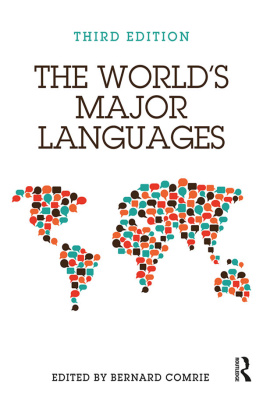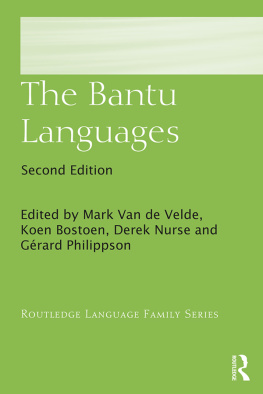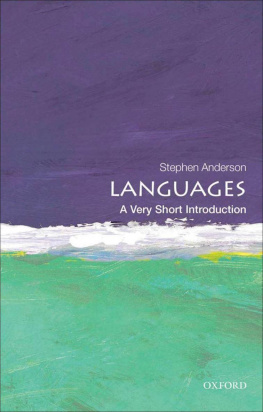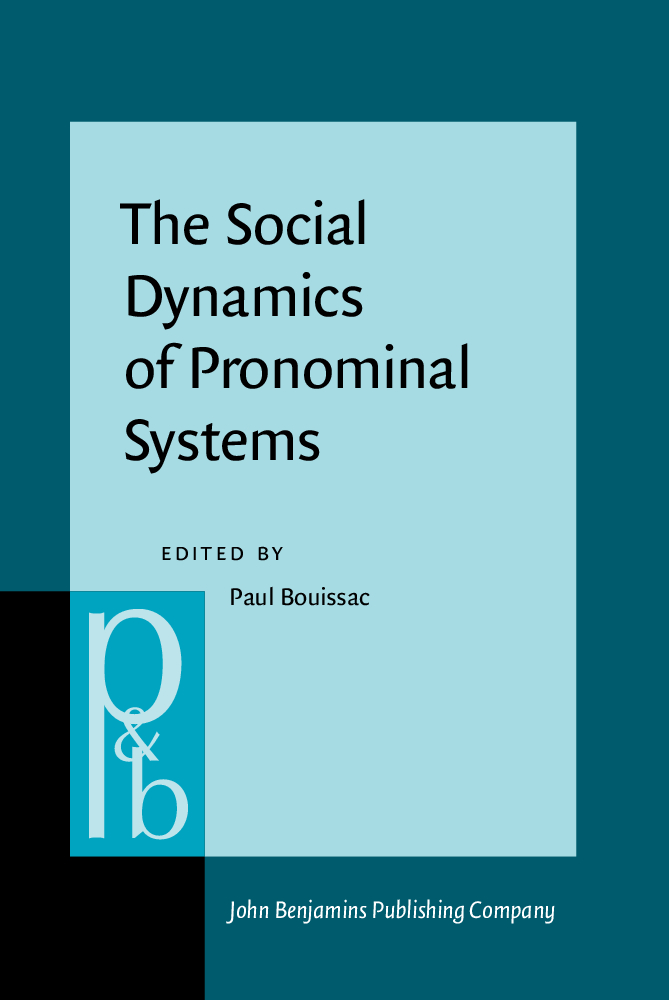Aim and scope of the book
The purpose of this book is to probe the pragmatic functions of personal pronouns in a representative set of languages and cultures. This project developed from a panel which took place at the 14th Conference of the International Pragmatics Association (Antwerp, July 2631, 2015). The panel itself included only four papers but it triggered an intense discussion that convinced the participants of the timeliness of the issues which had been raised. This initial panel was equally divided into papers examining the use of personal pronouns in two European languages and papers focusing on Asian languages. The present volume endeavours to maintain such a balance without, of course, attempting to be exhaustive. In addition to providing descriptions of different pronominal systems and the socio-dynamics of their use, it addresses two topics that greatly matter to contemporary societies: the translatability from one system into another and the evolution of norms under the pressure of social transformations.
Pronominal systems can be formally described from a grammatical point of view but their actual use is far more diverse and complex than suggested by the formal linguistic functions traditionally assigned to first-, second-, and third-person, singular or plural. As indexical tools, they receive their full meaning from the context of the communication acts in which they take part or which they report in the direct or indirect modes (). However, personal pronouns are primarily at work in orality, the initial medium in which language emerged a very long time ago, before the relatively recent invention of writing systems led to the creation of explicit, normative spelling and conventional grammatical rules.
It has often been noted that the phonetic characteristics of personal pronouns are fundamentally similar across many languages not only within the same family but also across several families ().
This suggests that personal pronouns likely originated in vocal signalling and thus form a primitive paradigm of acoustic communication that has been carried forward as articulate languages evolved. Comparison with vocal communication among primates indicates that these kinds of acoustic productions are akin to warning signals addressed to conspecifics or aliens ().
They are used to stake out territories, personal space, and convey dominance or, conversely, affiliation, cooperation, and submissiveness (). Typically, cultures that promote a high degree of civility tend to avoid the more aggressive forms of egocentric personal pronouns and replace them by indirect periphrases or metaphors. The eventual grammaticalization of these biosemiotic signals reduced them to the role of verbal markers that became agglutinated within the language chain. However, they appear to retain their original value in some instances of spoken languages mainly through intonation or even the addition of redundant phonetic elements and, in some other cases of verbal interactions, they are displaced through strategies of avoidance for the sake of civility. The latter bears witness to their earliest assertive or conflictual significance.
These hypothetical considerations about the signalling origin of personal pronouns are obviously difficult to prove but their mere plausibility, based on comparative evidence, can usefully sensitize us to the fact that the pragmatics of pronominal systems involves more than a simple application of grammatical principles to utterances in verbal communications. As suggested by the Swadesh list, personal pronouns rank the highest for their universality and show communality of features (). In English, the opposition this / these versus that / those, and, in French celui-ci / celle-ci / ceux-ci / celles-ci versus celui-l / celle-l / ceux-l / celles-l / bears witness that the third person is not an undifferentiated conceptual and pragmatic category but encodes distance parameters often produced in conjunction with hand, gaze, and head gestures.
Language is all too often perceived and conceived through the lens of literacy. Since the invention and institutionalization of writing systems, literate languages are evolving in a state of constant tension between the conservative forces of the standard written models at a given time and the flow of variations and innovations that keeps occurring in the spoken lexicon and grammatical structures as well as in the pragmatic norms of pronominal usage. Phonetic and semantic variations are relentlessly at work from generation to generation. Pragmatics is not merely the study of the ways in which abstract grammatical norms are implemented in discourse but it concerns the observing and documenting of languages in the making. Researching the use of pronominal systems makes it possible to observe the dynamic interface between language and social change both at the dyadic level and in the broader perspective of linguistic development and cultural evolution. offer in their edited volume insightful probes in the diachronic dimensions of pronominal uses through the examination of address terms in literary works mostly in European languages with an emphasis on English. This contribution to historical pragmatics sheds an interesting light on the essential variability and fluidity of the dynamics of pronominal systems under the constant societal forces that are at work in the life of languages.
The political sensitivity of pronominal systems
Because pronouns are more than any other parts of speech at the interface of languages and the people who use them, they form a sensitive zone at the seams of the social fabric. A case in point is the contemporary debates in most European languages regarding the relationship between pronouns and gender. In English, some activists consider that the compulsory binary distinction of masculine versus feminine forms in the third-person singular does not do justice to the whole spectrum of gender diversity and sexual identities. On the other hand, distinctions like he and she, and the corresponding possessive pronouns, cannot be transferred to the plural. The implied dominance of the masculine is resented by feminists who either strive to create gender-specific neologisms such as yerself as distinct from yourself, or simply do away with such gender-based differences by generalizing inclusive forms such as ze or re-defining existing pronouns such as they which had become specialized in modern English to express the plural third person. Conservative minds who have little understanding of the fundamentally arbitrary nature and historic lability of language, resist these linguistic innovations which they perceive as attacks on the integrity of the language and the standards with which they identify.
At any given time, the official language of the cultural elite is so central to the social order that any changes either natural or engineered are perceived as corruption or subversion of the very essence of national and cultural identity.







